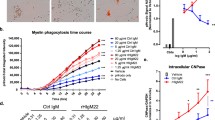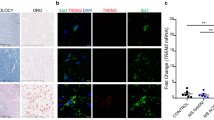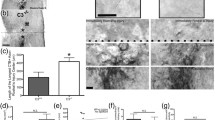Abstract
Microglia and macrophages play critical roles in the response of the central and peripheral nervous systems (CNS and PNS, respectively) to injury and disease, one of which is the removal of degenerated myelin by phagocytosis. Myelin removal is efficient during Wallerian degeneration, which follows injury to PNS axons, and in CNS autoimmune demyelinating diseases (e.g., multiple sclerosis) but is inefficient after injury to CNS axons. We suggest that inefficient myelin removal results from deficient microglia activation, reflected by the failure to up-regulate Galectin-3/MAC-2 expression, which marks a state of activation correlated with efficient myelin phagocytosis. Surprisingly, whether or not executing myelin phagocytosis, CNS microglia express the αM/β2 integrin complement receptor-3 (CR3/MAC-1), which has the potential of mediating efficient myelin phagocytosis. We hypothesize that CR3/MAC-1 might be present in distinct inactive and active states that determine, respectively, efficient and inefficient CR3/MAC-1-mediated myelin phagocytosis. We present evidence that CR3/MAC-1-mediated myelin phagocytosis is regulated in microglia and macrophages. First, CR3/MAC-1-mediated myelin phagocytosis has complement-dependent and -independent components. Second, an active complement system augments CR3/MAC-1-mediated myelin phagocytosis. Third, anti-αM monoclonal antibodies (MAbs) inhibit and anti-β2 MAbs augment CR3/MAC-1-mediated myelin phagocytosis in the presence and absence of an active complement system. Fourth, an active complement system modulates MAb-induced regulation of CR3/MAC-1-mediated myelin phagocytosis. Overall, MAb-induced phagocytosis regulation might range three- to sevenfold from inefficient to efficient. We suggest that one of the mechanisms underlying MAb-induced phagocytosis regulation is the induction/stabilization of inactive and active conformational changes. Monoclonal antibody-induced phagocytosis regulation must reveal a mechanism by which native extracellular molecules bind to and regulate CR3/MAC-1-mediated myelin phagocytosis in microglia and macrophages.
Similar content being viewed by others
References
Aldskogius H. and Kozlova E. N. (1998) Central neuronglial and glial-glial interactions following axon injury. Prog. Neurobiol. 55, 1–26.
Andrew D., Shock A., Ball E., Ortlepp S., Bell J., and Robinson M. (1993) KIM185, a monoclonal antibody to CD18 which induces a change in the conformation of CD18 and promotes both LFA-1- and CR3-dependent adhesion. Eur. J. Immunol. 23, 2217–2222.
Be’eri H., Reichert F., Saada A., and Rotshenker S. (1998) The cytokine network of wallerian degeneration: IL-10 and GM-CSF. Eur. J. Neurosci. 10, 2707–2713.
Bell M. D., Lopez-Gonzalez R., Lawson L., Hughes D., Fraser I., Gordon S., and Perry V. H. (1994) Upregulation of the macrophage scavenger receptor in response to different forms of injury in the CNS. J. Neurocytol. 23, 605–613.
Bruck W. and Friede R. L. (1991) The role of complement in myelin phagocytosis during PNS wallerian degeneration. J. Neurol. Sci. 103, 182–187.
Bruck W., Bruck Y., Diederich U., and Piddlesden S. J. (1995) The membrane attack complex of complement mediates peripheral nervous system demyelination in vitro. Acta Neuropathol. (Berl.) 90, 601–607.
Chen M. S., Huber A. B., van der Haar M. E., Frank M., Schnell L., Spillmann A. A., et al. (2000) Nogo-A is a myelin-associated neurite outgrowth inhibitor and an antigen for monoclonal antibody IN-1. Nature 403, 434–439.
DeJong B. A. and Smith M. E. (1997) A role for complement in phagocytosis of myelin. Neurochem. Res. 22, 491–498.
Driessens M. H., van Hulten P., Zuurbier A., La Riviere G., and Roos E. (1996) Inhibition and stimulation of LFA-1 and Mac-1 functions by antibodies against murine CD18. Evidence that the LFA-1 binding sites for ICAM-1, -2, and -3 are distinct. J. Leukoc. Biol. 60, 758–765.
Hughes P. E. and Pfaff M. (1998) Integrin affinity modulation. Trends Cell Biol. 8, 359–364.
Humphries M. J. (2000a) Integrin cell adhesion receptors and the concept of agonism. Trends Pharmacol. Sci. 21, 29–32.
Humphries M. J. (2000b) Integrin structure. Biochem. Soc. Trans. 28, 311–339.
Karim D. and Andersson T. (2000) Beta 2 integrin signaling in leukocytes. Front. Biosci. 5, 438–451.
Koski C. L., Vanguri P., and Shin M. L. (1985) Activation of the alternative pathway of complement by human peripheral nerve myelin. J. Immunol. 134, 1810–1814.
Liu W. T., Vanguri P., and Shin M. L. (1983) Studies on demyelination in vitro: the requirement of membrane attack components of the complement system. J. Immunol. 41, 778–782.
McKerracher L., David S., Jackson D. L., Kottis V., Dunn R. J., and Braun P. E. (1994) Identification of myelin-associated glycoprotein as a major myelin-derived inhibitor of neurite growth. Neuron 13, 805–811.
Mead R. J., Singhrao S. K., Neal J. W., Lassmann H., and Morgan B. P. (2002) The membrane attack complex of complement causes severe demyelination associated with acute axonal injury. J. Immunol. 166, 458–465.
Mirski R., Reichert F., Klar A., and Rotshenker S. (2003) Granulocyte macrophage colony stimulating factor (GM-CSF) activity is regulated by a GM-CSF binding molecule in Wallerian degeneration following injury to peripheral nerve axons. J. Neuroimmunol. 140, 88–96.
Mukhopadhyay G., Doherty P., Walsh F. S., Crocker P. R., and Filbin M. T. (1994) A novel role for myelin-associated glycoprotein as an inhibitor of axonal regeneration. Neuron 13, 757–767.
Petruzzelli L., Maduzia L., and Springer T. A. (1995) Activation of lymphocyte function-associated molecule-1 (CD11a/CD18) and Mac-1 (CD11b/CD18) mimicked by an antibody directed against CD18. J. Immunol. 155, 854–866.
Plow E. F., Haas T. A., Zhang L., Loftus J., and Smith J. W. (2000) Ligand binding to integrins. J. Biol. Chem. 275, 21,785–21,788.
Reichert F. and Rotshenker S. (1996) Deficient activation of microglia during optic nerve degeneration. J. Neuroimmunol. 70, 153–161.
Reichert F. and Rotshenker S. (1999) Galectin-3/MAC-2 in experimental allergic encephalomyelitis. Exp. Neurol. 160, 508–514.
Reichert F. and Rotshenker S. (2003) Complement-receptor-3 (CR3/MAC-1) and scavenger-receptor-AI/II(SRAI/II) mediated myelin phagocytosis in microglia and macrophages. Neurobiol. Disease 12, 65–72.
Reichert F., Saada A., and Rotshenker S. (1994) Peripheral nerve injury induces Schwann cells to express two macrophage phenotypes: phagocytosis and the galactose-specific lectin MAC-2. J. Neurosci. 14, 3231–3245.
Reichert F., Slobodov U., Makranz C., and Rotshenker S. (2001) Modulation (inhibition and augmentation) of complement receptor-3-mediated myelin phagocytosis. Neurobiol. Dis. 8, 504–512.
Rinner W. A., Bauer J., Schmidts M., Lassmann H., and Hickey W. F. (1995) Resident microglia and hematogenous macrophages as phagocytes in adoptively transferred experimental autoimmune encephalomyelitis: an investigation using rat radiation bone marrow chimeras. Glia 14, 257–266.
Robinson M. K., Andrew D., Rosen H., Brown D., Ortlepp S., Stephens P., and Butcher E. C. (1992) Antibody against the Leu-CAM beta-chain (CD18) promotes both LFA-1- and CR3-dependent adhesion events. J. Immunol. 148, 1080–1085.
Rosen H. and Gordon S. (1987) Monoclonal antibody to the murine type 3 complement receptor inhibits adhesion of myelomonocytic cells in vitro and inflammatory cell recruitment in vivo. J. Exp. Med. 166, 1685–1701.
Rotshenker S. (1997) The cytokine network of Wallerian degeneration. Curr. Top. Neurochem. 1, 147–156.
Rotshenker S. (2002) Co-operation between Schwann cells, fibroblasts and macrophages after axonal injury: a prelude for successful regeneration, in Glial Interfaces in the Nervous System—Role in Repair and Plasticity, Aldskogius H. and Frahe J., eds., IOS Press, Amsterdam, The Netherlands, pp. 3–12.
Saada A., Reichert F., and Rotshenker S. (1996) Granulocyte macrophage colony stimulating factor produced in lesioned peripheral nerves induces the up-regulation of cell surface expression of MAC-2 by macrophages and Schwann cells. J. Cell Biol. 133, 159–167.
Sanchez-Madrid F., Simon P., Thompson S., and Springer T. A. (1983) Mapping of antigenic and functional epitopes on the alpha- and beta-subunits of two related mouse glycoproteins involved in cell interactions, LFA-1 and Mac-1. J. Exp. Med. 158, 586–602.
Shamash S., Reichert F., and Rotshenker S. (2002) The cytokine network of Wallerian degeneration: tumor necrosis factor-alpha, interleukin-1 alpha, and interleukin-1 beta. J. Neurosci. 22, 3052–3060.
Silverman B. A., Carney D. F., Johnston C. A., Vanguri P., and Shin M. L. (1984) Isolation of membrane attack complex of complement from myelin membranes treated with serum complement. J. Neurochem. 42, 1024–1029.
Slobodov U., Reichert F., Mirski R., and Rotshenker S. (2001) Distinct inflammatory stimuli induce different patterns of myelin phagocytosis and degradation in recruited macrophages. Exp. Neurol. 167, 401–409.
Smith M. E. (2001) Phagocytic properties of microglia in vitro: implications for a role in multiple sclerosis and EAE. Microsc. Res. Tech. 54, 81–94.
Stoll G. and Jander S. (1999) The role of microglia and macrophages in the pathophysiology of the CNS. Prog. Neurobiol. 58, 233–247.
van der Laan L. J., Ruuls S. R., Weber K. S., Lodder I. J., Dopp E. A., and Dijkstra C. D. (1996) Macrophage phagocytosis of myelin in vitro determined by flow cytometry: phagocytosis is mediated by CR3 and induces production of tumor necrosis factor-alpha and nitric oxide. J. Neuroimmunol. 70, 145–152.
Vanguri P., Koski C. L., Silverman B., and Shin M. L. (1982) Complement activation by isolated myelin: activation of the classical pathway in the absence of myelin-specific antibodies. Proc. Natl. Acad. Sci. U. S. A. 79, 3290–3294.
Wilkins J. A., Li A., Ni H., Stupack D. G., and Shen C. (1996) Control of beta1 integrin function. Localization of stimulatory epitopes. J. Biol. Chem. 271, 3046–3051.
Williams M. A. and Solomkin J. S. (1999) Integrin-mediated signaling in human neutrophil functioning. J. Leukoc. Biol. 65, 725–736.
Zhang L. and Plow E. F. (1999) Amino acid sequences within the alpha subunit of integrin alpha M beta 2 (Mac-1) critical for specific recognition of C3bi. Biochemistry 38, 8064–8071.
Author information
Authors and Affiliations
Corresponding author
Rights and permissions
About this article
Cite this article
Rotshenker, S. Microglia and macrophage activation and the regulation of complement-receptor-3 (CR3/MAC-1)-mediated myelin phagocytosis in injury and disease. J Mol Neurosci 21, 65–72 (2003). https://doi.org/10.1385/JMN:21:1:65
Received:
Accepted:
Issue Date:
DOI: https://doi.org/10.1385/JMN:21:1:65




